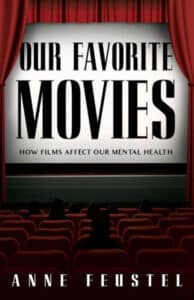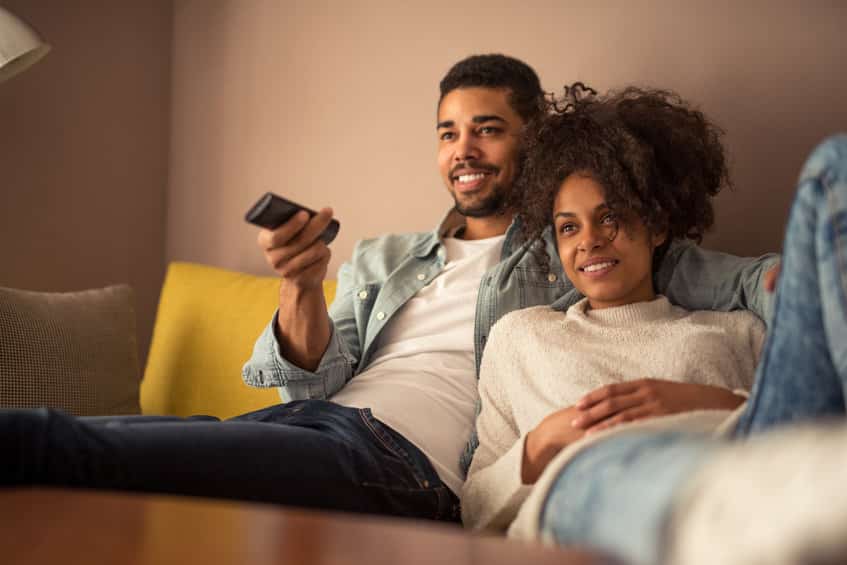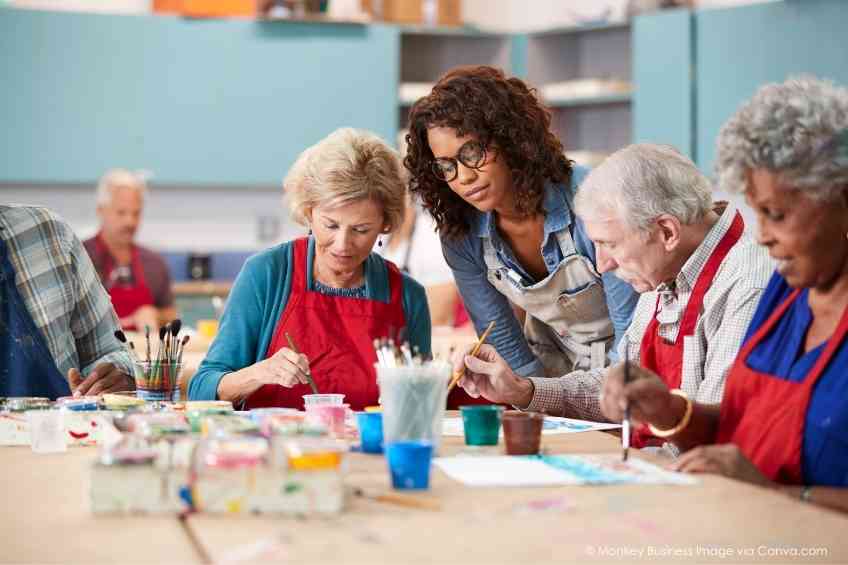Everybody loves going to the movies. There may be no better feeling than sharing a huge bucket of popcorn with someone you love while enjoying a classic flick. Maybe then, it shouldn’t be a surprise that this experience can be a great mental health tonic. There’s even an area of study developing around the concept—cinema therapy. So WellWell fired up the projector and spoke with field expert and author of Our Favorite Movies: How Films Affect Our Mental Health, Anne Feustel, to learn the basics of cinema therapy and all its applications.
You’ve experienced a long battle with several mental health issues, such as depression, mania, suicidal thoughts and anxiety, how have these progressed and impacted you throughout your life?
Basically, I started dealing with depression at age ten. It started out severe and it’s been moderate to severe ever since then. I started thinking about suicide at that age so that’s something that my brain just sort of goes to and the mania started when I was 19. I was hospitalized several times over the years since I was 19. Things have gotten pretty bad. It’s been a real rough road but things like movies and books help get me through it.
Do you feel as though these forms of media, films and books, are your main source of mental health treatment? Or do you find that they’re more of a supplement to traditional treatment?
I would say more of a supplement. The medication I take and the therapy I receive are the biggest along with the support I get from my family and friends. So, films and books are definitely a supplement but there are times when it’s hard for me to reach out or for whatever reason the therapy isn’t working as well as I would hope, then they play a bigger role.
 Our Favorite Movies: How Films Affect Mental Health, it largely deals with cinema therapy. What does this term mean to you personally?
Our Favorite Movies: How Films Affect Mental Health, it largely deals with cinema therapy. What does this term mean to you personally?
What it means to me is basically that I can use watching movies as a way to grow as a person by dealing with my anxiety, depression and mania. It’s a way to look at the world from a different set of eyes in a way that helps me be a little more whole, a little bit more understanding with myself and others.
How did you discover it?
I started researching how movies and mental health connect because I had realized it was something that personally was helpful to me. I read this book, The Motion Picture Prescription: Watch this Movie and Call Me in the Morning by Dr. Gary Solomon that was about cinema therapy. He was the one to really popularize cinema therapy.
When you’re looking for a film to help with mental health issues, what do you look for? Is it just the general theme of the movie being maybe perseverance and acceptance, or do you look more towards relatable characters?
Generally, it’s more towards the theme of the movie but characters are definitely a huge part of it as well. I think you have to have both because you can have the most marvelous theme or you can have the most marvelous relatable characters but without the two connecting together, it just doesn’t do as good of a job.
You mention in the book how many films help combat fat phobia, sexism and transphobia. What are some examples of this, and do you think that movies like this have helped us progress as a society to a certain degree to become more accepting?
I think there’s a lot of movies out there that deal with these issues. In regard to racism, there’s a lot of different movies that combat it, but Moonlight is a recent great example and it also combats homophobia. Many movies have the black character as someone who is more violent involved in gangs and I think Moonlight subverts this really well. These are characters who have dreams, hopes and fears. Both the black and gay characters in Moonlight are just so well rounded, so real and human. There’s a lot of movies out there that sort of turn things around on their head, turn away from the stereotypes and really show people and issues, the way these folks are living and it’s important to really see people as human and not just as these stereotypical images.
You also note that throughout your life, you have generally been a shy person but the communal experience of being able to go to the movie theater gave you this avenue to be able to connect with a room full of strangers. How has this helped your mental health and how much did you miss it over the last year plus with most movie theaters being shut down due to Covid?
It’s really helped me over my lifetime just by being with people and being in that place that’s a very low stakes environment. You don’t have to worry about saying the wrong thing to somebody and with my anxiety I worry often about hurting somebody’s feelings or looking stupid. Just being with these folks and laughing or crying with them, enjoying the movie with them. It’s huge. That low stakes, almost nurturing environment, is something quite extraordinary.
In studying these movies and using them as a form of therapy, do you find that they are more effective in the initial screening or are they more impactful and beneficial to your mental health through rewatching?
I think it’s through rewatching. It seems the more I watch something, the more I get out of it. While that first time can be amazing, when you revisit a movie you can settle in more for the enjoyment of it. You start to see new things and connect with the movie more.
You’ve written about how Inside Out is one of your favorite movies, if not, your favorite as well as being significantly beneficial to your mental health. What aspects of this film really hit these marks for you?
Inside Out is my favorite movie of all time. First of all, they normalize the fact that everybody feels joy, sadness, fear, disgust and anger. These are all equally important emotions. They don’t show one being more important as another. They don’t make you feel shame for experiencing any of them. Each emotion has a purpose. From sadness comes empathy and that’s so important.
Do a lot of Pixar movies achieve this?
I think so. For those of us who deal with not just depression but mental health issues in general, we are more likely to be more empathetic because we can sort of understand what people are going through. So, that’s a big part of it. But Pixar, in general, they’re all about emotions. It’s all about getting to you and seeing if you can cry, seeing if you can laugh and just try to understand other people better. I’m a huge Pixar fan, it’s a perfect gate way into cinema therapy.
About Anne Feustel
Anne Feustel is a business owner, editor, proofreader, and writer. With a B.A. in Sociology and a minor in Psychology, she is uniquely qualified to write about the human experience. Because she has struggled with her own mental health issues, she feels called to be an advocate for others who have the same issues. Her goal is to help everyone fine easily accessible ways to improve their mental health.
Learn More At amazon.com/Our-Favorite-Movies-Affect-Mental











